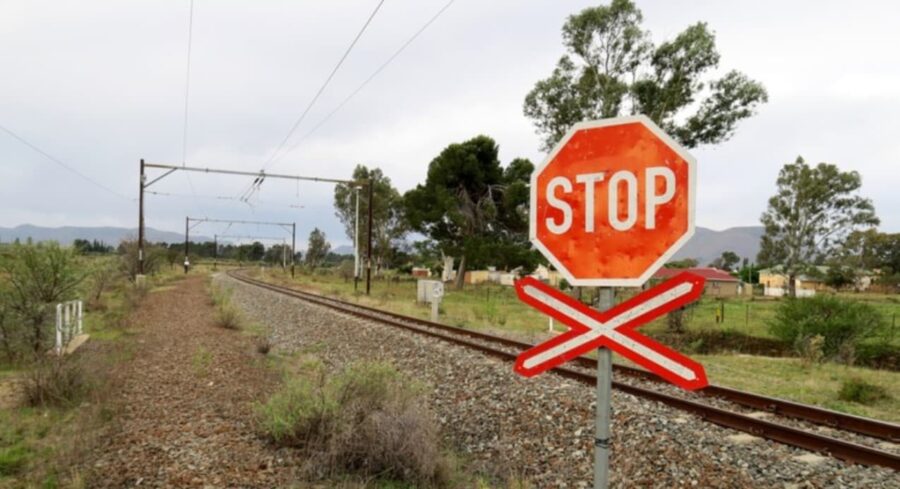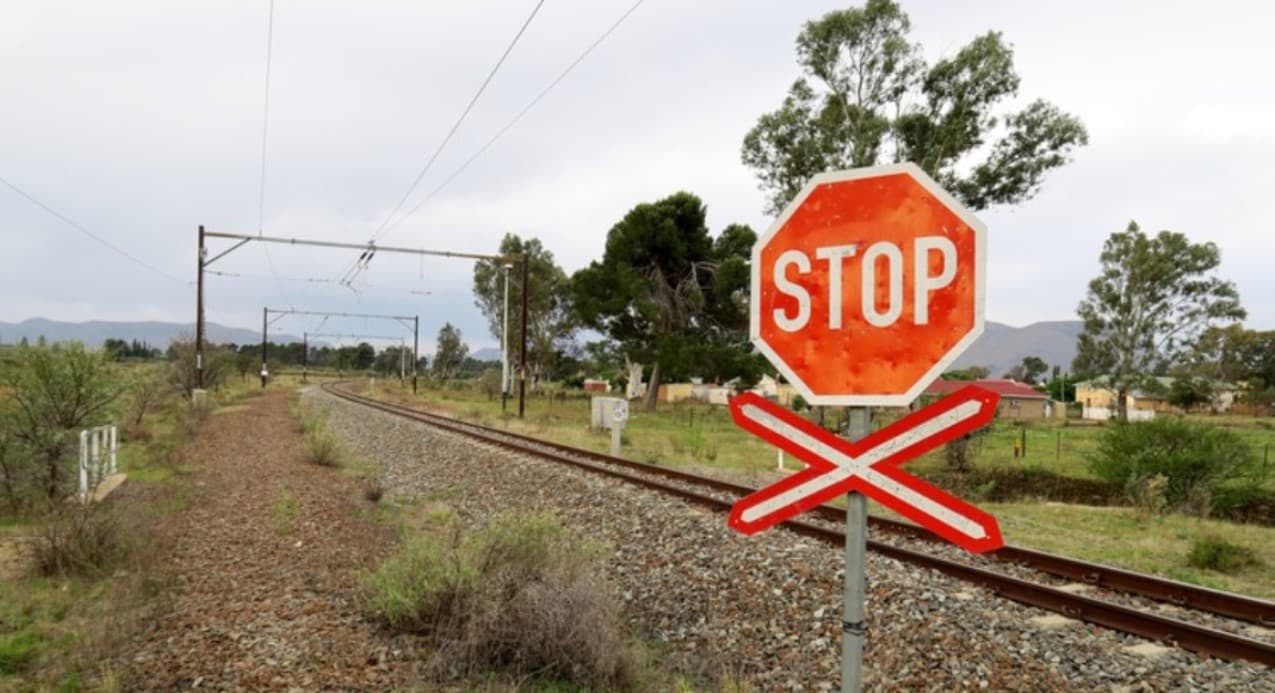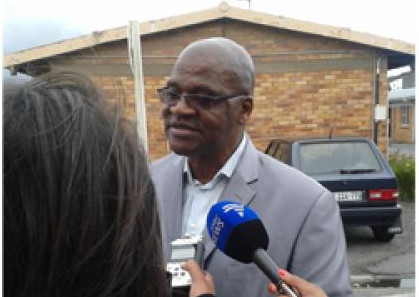
How to steal a railway line and stay out of jail
Legal manoeuvres have stalled the case against former PRASA acting CEO Mthuthuzeli Swartz and businessman Syed Mohiudeen

The case against former PRASA acting CEO Mthuthuzeli Swartz, who stands accused of stealing and selling 42km of railway line in the Eastern Cape, remains in limbo after four years of court postponements. It has also been more than a decade since the case was opened. Progress is being stymied by the High Court, which has yet to hear an appeal for the state to provide further particulars of the case.
- In February 2013, a case was opened in the Eastern Cape after Transnet security halted the theft of a disused railway line.
- It took six years before any arrests were made.
- The subsequent court case has dragged on for more than four years, with no end in sight.
Swartz was arrested on 22 January 2019 in relation to a case opened at the Elliot police station in the Eastern Cape in February 2013. Just more than a month later, on 27 February 2019, Cape Town-based businessman Syed Mohiudeen was arrested as co-accused.
According to the revised charge sheet at the Commercial Crimes Court in Gqeberha, Swartz and Mohiudeen acted in concert to steal the disused Transnet railway line between Sterkstroom and Maclear in the Eastern Cape in 2012. They are also, or alternatively, charged with defrauding Cape Town cousins Adrian and Cedric Samuels of R1.5-million, a deposit paid pending authorisation to uplift and sell the rail line.
How to (allegedly) steal a railway line
According to the charge sheet, Mohiudeen told Adrian Samuels, who had a company called Akisisa, that his company, Spanish Ice – of which he was the sole director – had 360,000 tons of used rail for sale from Metrorail, and Turkish buyers were interested.
Mohiudeen allegedly told them he could supply Akisisa with 30,000 tons of rail over 12 months, and that there was 25,000 tons of rail immediately available which was being kept at the Metrorail stockyard in Woodstock, Cape Town. Mohiudeen allegedly requested, and received, an advance of R1.5-million from Samuels to secure the release of the rail held at the Woodstock yard.
But the charge sheet states that despite the payment, the used rail was not released from the Woodstock yard due to “quantification of the stock”. With Samuels expressing dissatisfaction, Swartz allegedly suggested a trip to the Eastern Cape to identify the remaining rail that could be uplifted. Swartz, Mohiudeen and the Samuels cousins took the trip to Sterkstroom and Maclear on 1 November 2012 with Swartz, who was Metrorail Western Cape regional manager at the time, providing a map identifying the rail to be uplifted. Having seen the rail line, the Samuels cousins then asked Mohiudeen for proof of authorisation to uplift it.
“Whilst awaiting the requested documentation, the Samuels cousins (with the verbal authorisation from both accused) mobilised a workforce and commenced the upliftment of the railway line identified by the two accused. The Samuels cousins also entered into contracts with buyers and some of the uplifted rail material was transported to Durban Harbour and loaded into the buyers’ containers for onward exportation,” states the charge sheet.
The work came to a halt on 8 February 2013 when Transnet security stopped Akisisa from uplifting the rail. The charge sheet states Transnet was in the process of refurbishing the Sterkstroom–Maclear line “to service a coal mine project in Indwe”. The cost of replacing the uplifted line was put at almost R59-million.
It was at this point, in February 2013, that a case was opened in Elliot. It took six years before Swartz and Mohiudeen were arrested.

Despite Swartz being under investigation during that period, he was appointed as PRASA acting CEO of rail in January 2018. He served for three months before the PRASA board removed him in April of that year, because insurers wouldn’t provide Directors’ and Officers’ liability cover.
We spoke to a man who has lived in a railway house along the stolen track for decades. He said he recalled people using a truck with an attached crane to uplift one of the disused lines in Sterkstroom “around 2012 or 2013”. Standing with this man along the line, the remains of the rail bed from which the line was uplifted can be seen. A line runs alongside it to Johannesburg and is still in occasional use.
How to stay out of jail (for now)
Following their arrest, there were seven court appearances in the Gqeberha Commercial Crime Court in 2019, including bail hearings in which bail was set at R2,000 each, and postponements due to the Director of Public Prosecutions considering the addition of extra charges, and Mohiudeen having “to sort out instructions to attorney”, according to the court records.
The first trial date was set for 1 June 2020. But on that day, court records state only that Mohiudeen’s attorney Henry van Breda was absent and a new trial date was set for 14 December.
On 14 December 2020, Mohiudeen, pleading that his business had been impacted by the Covid lockdown, said he was not able to pay his lawyers. Postponement to 26 February 2021 was granted so that Mohiudeen could raise funds and “comply with financial instructions”.
In February, Mohiudeen continued to plead poverty, with Van Breda telling the court he was not able to access funds due to him for his “services” in Saudi Arabia as he had to personally travel there to obtain the funds, but could not do so due to continuing Covid travel restrictions.
A new date for June 2021 was set, at which point Mohiudeen was able to provide “financial instructions” to Van Breda. The parties agreed to set the trial for 6 September.
But on 6 September Swartz submitted an application for a separation of trials. In his application, Swartz pleaded he has not been responsible for most of the postponements and given the length of time since the case was opened, along with the delay in trial proceedings, his right to a fair trial without unreasonable delay had “seriously been violated”. Swartz further argued he was unable to find employment while his trial continued and the “negative reports” about the case affected his children.
New lawyers, an application and an appeal
A new trial date was set for 7 February 2022. But exactly one week before the trial, Mohiudeen switched his legal team, who argued on the court date that they were not prepared for trial.
Two weeks later, on 22 February 2022, Mohiudeen’s new attorney, Nasser Ally, filed a Request for Further Particulars related to the allegations that Mohiudeen acted “in common purpose” with Swartz.
Ally lists 31 points, including wanting to know particulars such as: “Who identified the railway line between Sterkstroom and Maclear, was it accused 1 or accused 2?” And: “The state is requested to indicate whether it intends to make use of any presumptions in law or fact in its endeavours to prove the allegations against [Mohiudeen]” and if so, “the state is requested to fully specify each and every presumption it intends relying upon”.
Eight postponements and remands followed in relation to the request, including a postponement on 10 May 2022 because Ally missed a flight from Durban.
Finally, state prosecutor Gerrit van der Merwe provided his reply to Request for Further Particulars on 15 November 2022, and arguments from the lawyers of the accused were heard. For reasons that are not clear in the court records, this matter took place in the Adelaide Court.
In that same month, Mohiudeen changed lawyers again, replacing Ally with attorney Aphsana Yusuph, resulting in delays as Yusuph struggled to obtain transcripts from the hearing in Adelaide. But on 8 December, Magistrate Nolitha Bara dismissed the Request for Further Particulars.
ALSO READ: Three reasons why you MUST visit Boulders Beach in Cape Town
Following the December break, Mohiudeen filed for leave to appeal Bara’s ruling and lodged his appeal with the Gqeberha High Court on 23 February 2023. As a result, there have been five further postponements of the case in the Commercial Crimes Court so far this year, awaiting the outcome of Mohiudeen’s High Court review.
According to reliable sources within the state attorney’s office, the Gqeberha High Court has, almost nine months later, yet to set a date to hear the matter.
The official response from the Head of Office for the state attorney’s office in Gqeberha, Sibongile Tito, stated that the matter is still pending before court and any further queries needed to be directed to the High Court.
